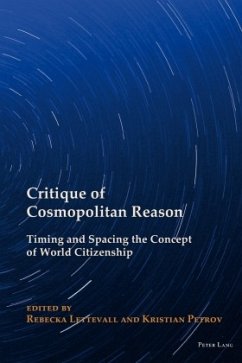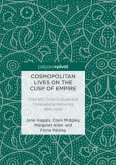Since the Enlightenment, the definition of terms such as humanity, citizenship and rights has fluctuated and these ideas continue to have relevance for contemporary discussions of globalization from a «cosmopolitan» perspective. This volume goes back to the conception of cosmopolitanism in Greek antiquity in order to trace it through history, resulting in an unmasking of its many myths. The concept is reconstructed with reference not only to well-known (and some lesser known) historical thinkers of cosmopolitanism, but also to noted «anti-cosmopolitans».
The first aim of the book is to display historical perspectives on a discourse which has been dominated by ahistorical presumptions. The second is to critically explore alternative paths beyond the Western imagination, redefining the Enlightenment legacy and the centre-periphery dichotomy. Most notably, Eastern Europe and the Arab world are integrated within the analysis of cosmopolitanism. Within a framework of conceptual history (Begriffsgeschichte), cosmopolitan reason is criticized from the viewpoints of comparative literature, psychoanalysis, phenomenology, postcolonialism and moral philosophy.
The book's critical approach is an attempt to come to terms with the anachronism, essentialism, ethnocentrism and anthropocentrism that sometimes underlie contemporary theoretical and methodological uses of the term «cosmopolitanism». By adding historical and contextual depth to the problem of cosmopolitanism, a reflexive corrective is presented to enhance ongoing discussions of this topic within as well as outside academia.
The first aim of the book is to display historical perspectives on a discourse which has been dominated by ahistorical presumptions. The second is to critically explore alternative paths beyond the Western imagination, redefining the Enlightenment legacy and the centre-periphery dichotomy. Most notably, Eastern Europe and the Arab world are integrated within the analysis of cosmopolitanism. Within a framework of conceptual history (Begriffsgeschichte), cosmopolitan reason is criticized from the viewpoints of comparative literature, psychoanalysis, phenomenology, postcolonialism and moral philosophy.
The book's critical approach is an attempt to come to terms with the anachronism, essentialism, ethnocentrism and anthropocentrism that sometimes underlie contemporary theoretical and methodological uses of the term «cosmopolitanism». By adding historical and contextual depth to the problem of cosmopolitanism, a reflexive corrective is presented to enhance ongoing discussions of this topic within as well as outside academia.








